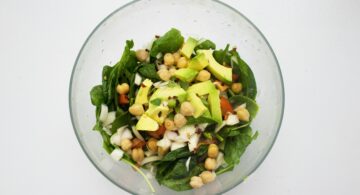The Forgotten Ingredients of the Mediterranean Diet
by Rob Leighton
Research spanning over four decades has shown that a traditional Mediterranean diet sharply reduces many health risks. People following this style of eating have:
- Lower levels of heart attacks
- Lower risks for diabetes and cancer
- Reduced forms of dementia, and even Alzheimer’s
You may associate the Mediterranean diet with extra virgin olive oil and red wine, but it is far more. It is the way the people of this region eat, beginning at breakfast and ending with the last bite taken each day.
- Vegetables, fruits and grains serve as the dietary foundation.
- Beverages, particularly tea, coffee or wine, provide other health-full nutrients.
- Red meat, dairy and eggs, seafood and poultry are added to this foundation to make some meals more delicious and the weekly meal plan more interesting.
But let me tell you about the forgotten ingredients of the Mediterranean diet. It’s blended spice and herb.
The benefits of spices extend beyond great flavor. Spices and herbs are Mother Nature’s most potent forms antioxidant compounds.
- Cinnamon, thyme, turmeric and oregano, for instance, deliver 20x more antioxidant power than blackberries or blueberries.
- Rosemary provides more than 15x the antioxidant power of cranberries.
This list goes on, but here is the challenge. Many modern cooks simply do not understand how to use spices and herbs, each and every day – breakfast, lunch and dinner. This is a lost opportunity to support long term, vibrant living while elevating the pleasure of eating. Let me show you how to harness the power of spice blends for the best disease-fighting nutrients available.
Antioxidants: What Do They Do?
So, what do antioxidants do? There is lots of chemistry here, but what’s important to understand is that our bodies’ naturally create oxidized compounds. These oxidized compounds are by-product of generating energy within every cell in our bodies. Left uncontrolled, they cause damage, contributing to heart disease, cancer and even aging itself.
Smoking and pollution increase the levels of these harmful compounds. We are also eating more foods that deliver the harmful compounds, like deep fried foods and flame-broiled meats. When plain meat is cooked, lots of harmful, oxidized compounds are created. When the meat is marinated with herbs and spices, or cooked with herbs and spice (like you might in a stew), the levels of harmful compounds created are sharply reduced. You see, herb and spice antioxidants are already working before you put the food in your mouth!
Similarly, when oils and fats are heated – even the health-full omega-3 oils – oxidized compounds are a by-product of high temperatures. Again, herbs and spices are the natural neutralizers and actually enhance the your body’s ability to absorb nutrients.
Now, here is what we also know. Different antioxidants work to support your health in different parts of the body. For example,
- Cinnamon supports healthier blood sugar levels.
- Cocoa supports a healthier cardiovascular system.
- Turmeric contributes to healthy brain function.
A leading spice in curries, turmeric intake may help explain the low rate of Alzheimer’s disease in India. Among people aged 70 to 79, the rate is less than one-quarter that of the United States. Turmeric also is widely used in North African cooking, a Mediterranean cuisine.
Globalization – Driven by the Spice Trade
World trade has been defined by the spice trade. Cinnamon, imported from Southeast Asia, can be found referenced in the Old Testament and in Egyptian documents dating to 2000 BCE. Spices initially came to the Mediterranean via overland trading routes and then by ship sailing around the Horn of Africa. The search for alternative trade routes led Columbus to venture west to the Americas.
Here is the key! Study after study is proving that the power of these plant-based nutrients is made many times more effective when they are used together. That is exactly what spice and herb blends do. They deliver multiple types of antioxidant compound.
And here is the tragedy. Most people cooking in the home today do not know how to use herbs and spices in ways that can really support health.
Spicing the Mediterranean Way
When I am cooking, I am not simply looking to create a healthy recipe, I am looking to create a healthy meal!I may have one very delicious recipe that is far from healthy, but I surround it with other dishes that bring a healthy balance to the meal. The meal itself is health; the one indulgence adds deliciousness. A Mediterranean diet builds on this philosophy.
Many Americans take the opposite view. They approach the meal with the view that one healthy dish, perhaps a side salad, is sufficient to make an unhealthy meal, healthy.
This is a daily eating mindset. For example, start in the morning with a healthy bowl of oatmeal. Move through the day with a salad at lunch and a few health snacks. Arrive at dinner believing the right to splurge has been earned – pizza and coke, fettuccine Alfredo, mac and cheese, steak and potatoes (with butter and sour cream), or sushi with lots soy sauce and white, sweetened rice.
But remember, a Mediterranean diet defines how one eats from the first bite in the morning to the last bite at night. It certainly makes room for all forms of delicious foods, but it keeps the right balance – at every healthy meal.
As I take my clients on a journey toward healthier eating, I take a similar view of spice and herbs. These flavorful ingredients are not something we look to add to a few recipes each week. We find ways to enjoy these ingredients throughout the day.
My commitment to spice has had another benefits, as well. It has helped me and my clients break free of eating habits that push up cholesterol, blood pressure and inflammation levels, while adding pounds to the waistline. A commitment to spicing will help you find new and delicious ways to satisfy the love of food, healthfully.
I wrote Mediterranean Spice Blends: The Forgotten Ingredients of a Heart Healthy Diet, to help my clients create healthier and tastier foods with spice blends. We start with 5 different spice blends, delivering 25 different natural herbs and spices (how’s that for a multivitamin!). No salt, no sugar and no MSG. At least five different recipes are provided for each spice blend. In the book you will find recipes for appetizers, soups, vegetables, whole grains, chicken, fish and even dessert and breakfast.
Here are some of the recipes that you will find in the e-book:
- Roasted Spiced Salmon
- Marinate Chicken Kabobs
- North African Spiced Sweet Potatoes
- Strawberry Rhubarb Cobbler
- Spice Bean Salad
- Brown Rice Pilaf with Onions & Lentils
- Barley Pilaf with Smoked Paprika, Hot Pepper & Sweet Spice
- Artichoke, Red Pepper Pizza
- Brussels Sprouts, White Beans, Pasta & Pine Nuts
- Apricot Lentil Soup
- Spiced Poached Pears
- Dark Chocolate Truffles with Cinnamon and Cocoa
Another Mediterranean Diet Secret – Start the Meal Right
In Mediterranean-style eating, the meal often will start with medley of vegetable dishes. A variety of fresh, marinated, grilled or roasted vegetable recipes is prepared. Each is seasoned differently. Two, three, four or more may be served.
- In Italy, these dishes are part of the antipasto.
- In Phoenicia (modern day Israeli, Lebanon and Syria) and North Africa, these salads are part of the mezze.
- In Spain, these are part of the tapas tradition.
Together, they deliver a highly satisfying course – and you may well find yourself filling-up on health-full foods.
These dishes also have a great place in busy life. Many can be made ahead of time and stored for a few days.
Here’s another benefit! Great chefs all over the world are showing how spice blends cut the need for salt. Spice, herbs and spice blends impart the more intense flavor that meats, grains and vegetables often lack. Salt does enhance subtler flavors of blander foods – spices and herbs can be used instead to add flavor intensity, especially when blended with acidic ingredients, like vinegars, wines and lemon. Many of the recipes I’ve put together combine these power house ingredients in marinades and sauces.In Mediterranean Spice Blends, you will find great recipes to get you started, and I send all my readers more recipes to keep every healthy meal interesting and delicious.
So discover how to use the forgotten ingredients from one of the world’s healthiest diet, in Mediterranean Spice Blends: The Forgotten Ingredients of a Heart Healthy Diet.
Rob is known as a food passionisto and life’s magic moments occur over meals with family and friends. He happily wanders the aisles of gourmet food stores, farmers’ markets and ethnic delicatessens, preferring to end the day with a good cookbook. Rob brings a career as an executive in food and nutrition to reduce his cholesterol levels to the point where no medications are necessary. He wrote The Kardea Gourmet, Smart & Delicious Eating for a Healthy Heart, with Mayo Clinic-trained cardiologist, Dr. Richard Collins, also known as the Cooking Cardiologist. Rob is the founder of Kardea Nutrition. Kardea, which means heart in Greek, combines a love food with a deep knowledge on how to use the best natural solutions to support heart health.



























